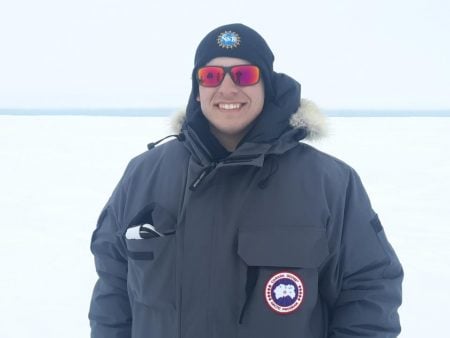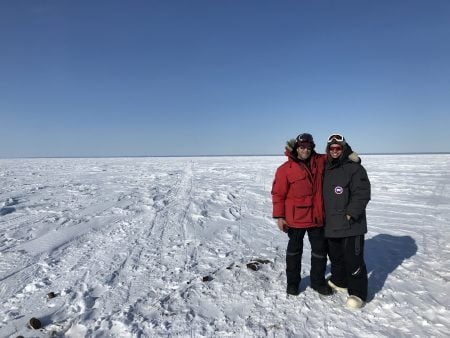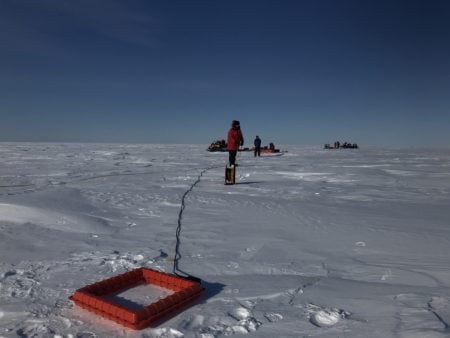
It all started with a geology course. After graduating high school, Michigan Tech alumnus Caleb Kaminski wasn’t sure what to study, but he knew it would be STEM-related. While working towards his associate’s degree at West Shore Community College, Kaminski tried it all, from aquacultural science to computer science to physics. “But everything clicked when I stumbled upon an introductory geology course,” says Kaminski. “I was hooked instantly!”
Even then, Kaminski knew he wanted his academic career to include more than just geology. “When I discovered Michigan Tech offered a degree in geological engineering, I was sure I found the right path to embark on. It combined my newfound love for geology with the challenging engineering component I was eager to be challenged by. And just like that, I found my perfect academic match!”
That perfect match led to Caleb Kaminski receiving his bachelor’s degree in geological engineering in 2021 and his master’s degree in geophysics in 2022 from Michigan Tech. Kaminski describes his years at Michigan Tech as transformative. “Michigan Tech gave me a fresh perspective and allowed me to see the world more objectively, paving the way for successes I had never imagined,” says Kaminski. “I feel a wave of emotion when I think about how the university has molded me.”
Kaminski credits much of his success to becoming involved with the Michigan Tech community. Early on in his days at Tech, he landed a job at the front desk of the Department of Geological and Mining Engineering Sciences. “This role introduced me to many faculty and students, making me feel even more connected and engaged with my peers. Before I knew it, I was diving into various research projects during my undergrad,” he says.

During his time at Tech, Kaminski collaborated with Chad Deering on sediment analysis using scanning electron microscopy, worked with Thomas Oommen on early warning railroad systems, and explored paleomagnetic analysis in the magnetism lab with Aleksey Smirnov. Kaminski also served as a teaching assistant for Jeremy Shannon’s Field Geophysics and again with Smirnov for his Fundamentals of Geophysics class for multiple semesters. Kaminski teamed up with Paul van Susante on NASA’s LuSTR research and collaborated with the Geo-Institute and the Federal Highway Administration. Kaminski says he’s thrilled with where his academic journey has led him. “These experiences enriched my knowledge, ignited my passion, and helped me see the world in a more profound way.”
And the journey continues. While in graduate school, Kaminski joined Kenneth Hinkel’s team to study permafrost in Utqiagvik (Barrow), Alaska.
“Living there for a week, I got to immerse myself in the local culture and learn from world renowned scientists, which was truly enriching,” says Kaminski. Alaska would become more than just a research trip destination; now, it’s home. Since graduating, Kaminski has moved to Anchorage, which he describes as a nature lover’s paradise.
“I’ve joined the PND Engineers, Inc. team as a staff engineer. They recognize and value my expertise in geophysics, so now I spearhead geophysical surveys that take place across Alaska for the company. It’s truly an exceptional opportunity for me to grow more professionally,” he says.

Looking forward, Kaminski is interested in emphasizing geophysical applications within the realm of geo-engineering. “I dream of establishing my own engineering consultancy or innovating the latest geophysical technology.”
When asked what advice he would give prospective geological engineering and geophysics students, Kaminski recommends making the world your classroom. “Embark on nature excursions, hunt for hidden waterfalls, discover unique minerals, marvel at intriguing rock formations, and interpret the earth’s stories etched into its landscapes. When you apply classroom knowledge in such tangible ways, it sticks with you, making learning seamless and captivating.”
About the College of Engineering
Michigan Tech’s College of Engineering offers more than 15 bachelor of science degrees in biomedical engineering, chemical engineering, civil, environmental and geospatial engineering, electrical and computer engineering, engineering fundamentals, geological and mining engineering and sciences, manufacturing and mechanical engineering and technology, materials science and engineering, and mechanical and aerospace engineering.
Our engineering graduate degree options include master’s and PhD programs, along with robust online certificate programs for busy professionals. Follow Michigan Tech Engineering on Facebook, Instagram, LinkedIn, and Twitter for the latest happenings.